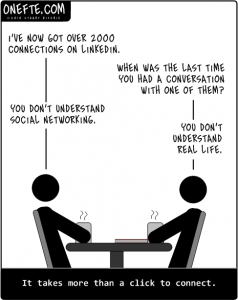How to reject a connection on LinkedIn.
 Do you ever have someone question what you fundamentally believe is right, and because you fundamentally believe it’s right, you find yourself lost for moment for a way to answer them?
Do you ever have someone question what you fundamentally believe is right, and because you fundamentally believe it’s right, you find yourself lost for moment for a way to answer them?
The other day I was talking to someone about LinkedIn.
She said she didn’t like it. She thought it was a waste of time from a networking point of view. Her main concern was, however, that she was in an industry that made most people unhappy. So rejecting a connection on LinkedIn would just make that worse.
I said “hmmm, let me get back to you on that last point” and promised I would give her some ways to manage rejecting the the many connection requests she anticipated.
But, first, because I cannot help myself, here are some benefits about being a bit of a LinkedIn tart.
Yes you get spam – and I have moaned about this previously.
To manage that, I simply don’t respond to a spam email that is sent to me among hundreds.
As far as I am concerned, that person is just trying their luck. If you send something to me personally, and it’s obvious that it is personal, I will respond.
I have over 20,000 connections. I moderate three LinkedIn groups. I am not overwhelmed by genuine requests for help. So far it’s been manageable – or perhaps I just don’t look too helpful 😉
I have stayed being an open networker.
I do this because essentially I do not know what that other person can offer me, or what I can offer the other person.
That’s what makes it interesting. I work on the assumption that you never know. Apart from the goodwill factor, for me the biggest benefit of being a bit tarty is some passive marketing.
If I post something out in my field of expertise, it appears in someone’s home page for a while. Often people share my stuff. I love being surprised by who shares my information.
I don’t think of my online network as the same as my offline network.
I use Facebook in particular to keep people whom I have met and like, under my umbrella. My LinkedIn network is my “network lite.” It’s the starting point for a relationship. I know I will still have to put effort into to that relationship to make it any deeper.
On the connector side I know when I just send the standard email “I’d like to add you to my professional network on LinkedIn” I am being a bit lazy, or essentially I am trying my luck. A response to that comes as a surprise or means that I have invited another open-networker.
Here’s how I have seen people physically manage their connection requests.
Some people put their rules of engagement on their summary. I’ve seen people write: “I am happy to connect if you can explain how we both will benefit.” This may or may not work, and relies on people reading down your profile.
Some people send a reply saying, “thanks for the offer, could you tell me more about yourself and how we could help each other?”
Other people say that they are “keeping their connections tight because of the management factor.”
The first response puts it back on a lazy networker, and makes them think. The second shuts the conversations down. I think both responses seem pretty inoffensive.
Apart from the passive marketing potential or the potential to start decent relationships, the fundamental reason to at least have a profile on LinkedIn, is to own that online real estate with your name on it.
You don’t want your googleganger to do you too much damage!
Or you may just have to think about giving to your network before you can get anything back.
Get our FREE report (Plus some bonus tips to help make you look like the superstar you are)
Learn how to use your LinkedIn profile to attract attention from employers and headhunters.
Click here to get the report and top tips from me (Karalyn Brown) Australia’s most connected career professional on LinkedIn.
You’ll get great tips on:
- Avoiding the insanely dumb things people do when they don’t know how to use LinkedIn
- Tips on how to create a powerful LinkedIn profile that will stand out to attract recruiters, headhunters and employers
- How to entice people to actually read all your LinkedIn profile to understand what you do, then seek to connect with you
- How to stay visible in searches, with little work on your part
- Plus we’ll also send you great LinkedIn tips and special offers emailed directly to you…

 Follow
Follow

{ 5 comments… read them below or add one }
Just tell her: waste of time? an SNS that is pure profesionalism and has 100M users. waste of time? Delve deeper.
I like how you acknowledge that an #in connection is a “starting point that I will have to put in effort to make deeper.”
As for the open networkers, with respect, while the “LIONs” love to tell us (real) networkers that they believe in ‘digging a well before they are thirsty,’ when you have never spoken with someone – let alone met them, worked with them, etc. – what between you is real? If they ask you to do something that takes ten minutes, would you? Would they for you? I’ve been networking for years, and for me, this is the brass ring: how much would we do for each other?
It’s great to see your passion for LinkedIn and you pose some valid points.
I’ve observed that those who consider LinkedIn a waste of time merely do not understand how to use it. Many are late adopters of social media who just have no comprehension that it is a community designed for professional interaction. Some naively think that if they put their name and current position on the site, job offers should come pouring in.
It’s not unusual for recruiters to have connections in the thousands, but the average person does not need to cast their net so wide. I recommend connecting with those you already know offline and a handful that may be purely online connections.
The network should be a group that can offer you career or business scope by means of referral or recommendation, and that is based on a real connection, evidenced by their knowing your achievements.
I have been approached by those who have made false claims about themselves and others who I’ve had to renounce as they falsely approached people in my network, claiming that I had referred them. So as with any social community my advice is to be circumspect about those who ‘cold call’ you on the site.
I don’t wish to appear to be hijacking the thread, but this is relevant – a little guide to help others with a basic LinkedIn account http://slidesha.re/mBS2st
Really great answers. Funnily enough, we’ve been plagued by folks who think Facebook is the appropriate place for “networking” with people you’ve never met in person. And we send them to our LinkedIn accounts, if they’re in the industry. If not, we use something similar to what you’ve posited above. Or we try to, anyway. Sometimes, someone slips through the cracks and gets ignored by accident. 🙁 Great suggestions, though! Thanks!
How to reject an invitation to connect on LinkedIn http://t.co/VpbIhMF3